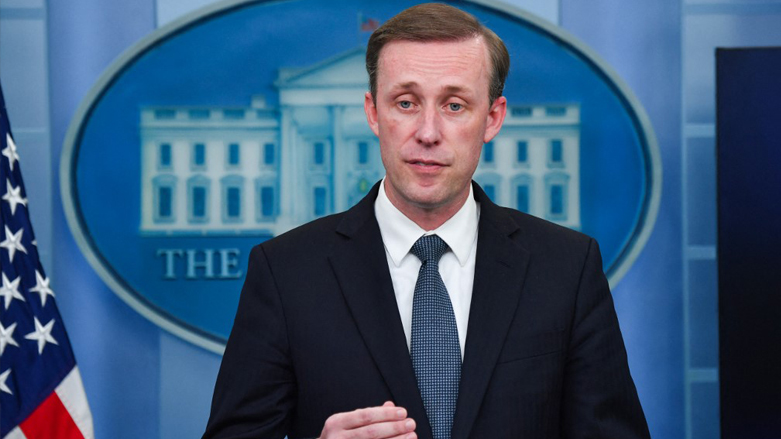US reiterates: Iran is selling armed drones to Russia
“So much so that its great power patron Russia has taken note,” ben Taleblu added while he asked a key question, “What is Iran getting in return?”

WASHINGTON DC (Kurdistan 24) – On Wednesday, as US President Joe Biden flew to Israel for his first trip to the Middle East as president, National Security Council Advisor Jake Sullivan reiterated remarks that he first made on Monday: Iran is preparing to send “up to several hundred” weapons-capable drones to Russia for use in Ukraine.
Asked to provide further details, Sullivan declined to reveal sensitive intelligence, but he did say, “We have not seen evidence of delivery” of the drones, or UAVs (Unmanned Aerial Vehicles), “but we have seen evidence of engagement between the two countries” on the “specific issue of large numbers of UAVs, including weapons-enabled UAVs for Russia to acquire from Iran.”
“Tehran excels in the procurement, production, and proliferation of technologies and military capabilities that offer cheap and effective offsets against conventional military power,” Behnam ben Taleblu, a senior fellow at the Foundation for Defense of Democracies, advised Kurdistan 24.
“So much so that its great power patron Russia has taken note,” ben Taleblu added while he asked a key question, “What is Iran getting in return?”
“Russia deepening an alliance with Iran to kill Ukrainians is something that the whole world should look at,” Sullivan affirmed, and they should see it “as a profound threat.”
Sullivan’s words, ironically, might have been best addressed to some of his colleagues in the Biden administration itself, as well as to like-minded officials in the European Union.
Reviving the 2015 Iranian nuclear deal, formally known as the Joint Comprehensive Plan of Action (JCPOA), which former president Donald Trump left in 2018, was the Biden administration’s “signature Middle East initiative” after it took office as The Wall Street Journal recently characterized that diplomacy.
Even more, the Biden administration was so eager to conduct talks on reviving the JCPOA that it began by accepting an unnecessary and awkward Iranian demand. Tehran refused to speak directly to Washington, and so the EU assumed a key intermediary role, passing messages between the two parties and, in the process, eroding US authority over its own negotiating position.
Indeed, just two weeks ago, EU foreign policy chief, Josep Borrell, rushed to Iran on the heels of Russian Foreign Minister Sergei Lavrov because Lavrov had said in Tehran, along with his Iranian counterpart, that the two countries favored resuming the JCPOA negotiations, suspended since last March.
Incredibly, once in Tehran, Borrell announced the resumption of JCPOA negotiations without even checking to determine if the differences between the US and Iran that had led to the extended suspension of the talks had been overcome.
Israeli Prime Minister Yair Lapid protested that Borrell, in his rush to resume negotiations, had made “a strategic mistake” and had sent “the wrong message to Iran.”
Nonetheless, despite its own doubts, the Biden administration went along with Borrell and joined in the talks, which were held in Qatar rather than Vienna, where all previous sessions had been held.
A mere two days later, the renewed JCPOA discussions ended in failure.
Read More: Iran nuclear talks end after just two days, as doubts grow about effort
Iran Aligned with Russia
On Tuesday, after Sullivan’s statement the day before that Iran was preparing to provide hundreds of drones for Russian use in Ukraine, the Kremlin announced that Russian President Vladimir Putin would visit Iran the following Tuesday.
The Kremlin announcement highlighted another failure in the EU’s diplomacy on Iran.
Borrell, and the EU more broadly, have responded toughly to Russia’s unprovoked aggression against Ukraine, and Borrell has denounced Moscow’s “war crimes.” But Borrell, and his staff, seem not to have recognized that Tehran is increasingly aligned with Moscow!
Sullivan’s remarks about the danger posed by “Russia deepening an alliance with Iran to kill Ukrainians” will, hopefully, have an impact in Brussels.
However, America’s Middle East allies need no such lesson. Israel and Saudi Arabia—which Biden will visit on Friday for a meeting that will include the other Gulf states, as well as Iraq, Egypt, and Jordan—already recognize Iran’s aggression. And, almost certainly, they welcome that Washington is coming around to their view.